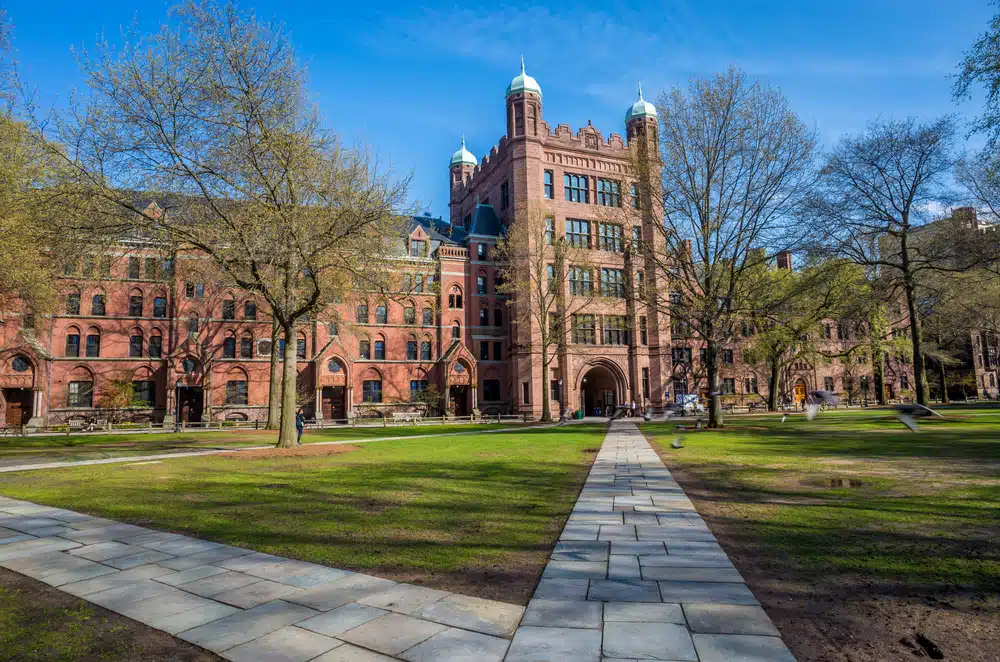How to Ace Your Yale Interview
With more students seeking to be part of the prestigious Ivy League institution like Yale University every year, the competition cannot be overstated. One critical stage of the admission process is the interview. This comprehensive guide will provide insights on how to excel and stand out during your Yale interview.
Understanding the Yale Interview Process
The Yale interview process aims to obtain a clearer and broader understanding of the applicant beyond academic achievements. Through the conversation, the interviewer evaluates if the student will fit into Yale’s diverse and intellectual community.
Attending an interview for admission to Yale University can be an exciting and nerve-wracking experience. It is an opportunity for applicants to showcase their personality, interests, and potential contributions to the Yale community. While the application materials provide a glimpse into an applicant’s achievements and qualifications, the interview allows for a more personal and in-depth evaluation.
The Purpose of the Yale Interview
The primary purpose of the Yale interview is to assess the applicant from multiple angles that may not be apparent in the application materials. The university takes this opportunity to learn more about your personal interests, career aspirations, values, and how these align with the Yale community.
During the interview, the Yale representative aims to understand your motivations for choosing Yale and how you envision yourself contributing to the university’s vibrant academic and social environment. They want to gauge your level of enthusiasm and determine if you possess the qualities that align with Yale’s mission and values.
Moreover, the interview also allows the school’s representative to provide you with an authentic idea about life at Yale. It’s a platform for you to ask your questions, which should show your true interest in the school. By engaging in a thoughtful conversation, you can gain valuable insights into the university’s culture, resources, and opportunities.
What to Expect During the Interview
The Yale interview typically lasts about thirty minutes to an hour. It is often conducted by a Yale alumnus who will ask various questions ranging from your academic interests and extracurricular activities to your aspirations and reasons for choosing Yale.
During the interview, it is important to remember that the Yale interview is not about academic knowledge testing but a chance to tell your unique story and showcase why you are a great fit for Yale. The interviewer wants to understand your passions, experiences, and how you have grown as an individual.
Be ready to articulate your thoughts clearly and listen carefully to the interviewer. It is crucial to express yourself authentically and provide specific examples to support your answers. The interview is an opportunity to demonstrate your communication skills, critical thinking abilities, and intellectual curiosity.
Additionally, the interviewer may also inquire about your leadership experiences, community involvement, and any challenges you have faced. They want to assess your ability to navigate different situations, work collaboratively, and make a positive impact on the Yale community.
Remember, the interview is not a test but a chance to engage in a meaningful conversation. Embrace the opportunity to share your unique perspective and highlight the qualities that make you an exceptional candidate for Yale University.
Preparing for Your Yale Interview
Preparing for your Yale interview is an essential step toward a successful application. It is crucial to invest time and effort into researching Yale University and reflecting on your personal and academic achievements. By doing so, you will be able to showcase your genuine interest in the school and stand out from other applicants.
Researching About Yale
To truly understand Yale University, it is important to dive deeper into its academic offerings, resources, traditions, and culture. By familiarizing yourself with the university’s values and how they align with your aspirations, you can demonstrate a genuine connection to the institution.
Start your research by exploring Yale’s official website, where you can find comprehensive information about its various programs, faculty, and campus life. Additionally, consider reaching out to Yale alumni to gain valuable insights into their experiences and perspectives. Their firsthand knowledge can provide you with a unique understanding of what it means to be a part of the Yale community.
If you are unable to visit the campus in person, taking an online campus tour can be an excellent alternative. Virtual tours often provide interactive experiences that allow you to explore different areas of the campus, including classrooms, libraries, and student gathering spaces. This virtual exploration can help you visualize yourself as a student at Yale and further enhance your understanding of the university.
Reflecting on Your Personal and Academic Achievements
Reflecting on your personal and academic achievements is a valuable exercise that can help you articulate your strengths and skills during the interview. It is not enough to list your accomplishments; you should also delve into the process, lessons learned, and personal growth that resulted from these experiences.
When identifying examples to discuss during the interview, focus on instances that highlight your leadership skills, problem-solving abilities, resilience, creativity, and any other desirable traits. By sharing compelling stories that showcase these qualities, you can engage the interviewer and leave a lasting impression.
Consider the impact of your achievements, both on yourself and others. How did your actions contribute to positive change or growth? What challenges did you overcome along the way? Reflecting on these aspects will allow you to provide a more comprehensive and meaningful account of your accomplishments.
Furthermore, don’t shy away from discussing any setbacks or failures you may have encountered. Demonstrating resilience and the ability to learn from challenges can be just as valuable as highlighting successes. Admissions officers at Yale are interested in applicants who demonstrate a growth mindset and a willingness to learn from their experiences.
Overall, thorough preparation is key to a successful Yale interview. By researching Yale University and reflecting on your personal and academic achievements, you can demonstrate your genuine interest in the school and present yourself as a well-rounded candidate. Remember to be authentic, thoughtful, and confident during the interview, as these qualities will undoubtedly leave a lasting impression on the interviewer.
Tips for During the Interview
How you present yourself during the interview is just as crucial as your preparation. Here are some tips on making a positive first impression and answering questions effectively.
Making a Positive First Impression
First impressions matter during the Yale interview. Being punctual and choosing conservative and professional attire can go a long way in creating a positive impression. Also, ensure a polite, friendly demeanor and maintain good eye contact throughout the interview.
When you arrive at the interview location, take a moment to compose yourself before entering the room. Take a deep breath and remind yourself of your qualifications and strengths. This will help boost your confidence and radiate positive energy.
Remember to turn off your mobile phone and avoid any other potential distractions to demonstrate your full attention and respect for the interviewer. It is important to show that you are fully engaged and focused on the conversation.
As you enter the room, greet the interviewer with a firm handshake and a warm smile. This will help establish a friendly and professional rapport right from the start.
Answering Questions Effectively
When answering questions, remember to be concise and on-point yet thorough. Be honest and authentic in your responses. Part of answering effectively is also being an active listener, so don’t rush with your answers and take the time to understand the questions asked.
Before responding to a question, take a moment to gather your thoughts. It is okay to pause briefly to organize your ideas and provide a well-structured answer. This will demonstrate your ability to think critically and communicate effectively.
Providing specific answers with concrete examples is more effective than providing generic or vague responses. Tell relevant stories showcasing your achievements and how you overcome challenges, as this will make you more memorable. The interviewer wants to see your ability to apply your skills and experiences to real-life situations.
Additionally, it is important to show enthusiasm and passion when discussing your interests and goals. Let your genuine excitement shine through as you talk about your academic pursuits and extracurricular activities.
Remember to maintain a positive and confident tone throughout the interview. Even if you encounter a difficult question, approach it with composure and try to provide a thoughtful response.
By following these tips, you can make a lasting impression during your Yale interview. Good luck!
Post-Interview Actions
The Yale interview process does not end when you step out of the interview room. Post-interview actions, like sending a thank-you note and follow-up, can leave a lasting positive impression.
After the intense and nerve-wracking experience of a Yale interview, it is important to take a moment to reflect on the conversation and consider the next steps. While the interview itself is crucial, what you do afterward can also greatly impact the overall impression you leave on the interviewer.
Sending a Thank-You Note
It is highly recommended that you send a thank-you note to your interviewer within 24 hours of the interview. This simple act of gratitude not only shows your appreciation for their time and effort but also demonstrates your professionalism and attention to detail.
When crafting your thank-you note, it is important to keep it brief and to the point. Start by expressing your gratitude for the opportunity to interview at Yale and then mention specific aspects of the conversation that resonated with you. This could be a particular question that made you think deeply or a shared interest that you discovered during the interview.
By referencing these specific moments, you not only show that you were actively engaged in the conversation but also reinforce the rapport that was built during the interview. This personal touch can make your thank-you note stand out among the many others that the interviewer may receive.
Following Up After the Interview
After sending your thank-you note, it is important to patiently wait for a response from the interviewer or the admissions office. While it can be tempting to check your email or eagerly await a phone call constantly, it is crucial to give the interviewers the necessary time to review your application and make their decision.
However, if a few weeks have passed and you have not heard any updates, it may be appropriate to follow up with the interviewers. This follow-up email should be concise, professional, and respectful. Begin by expressing your continued interest in attending Yale and then politely inquire about the status of your application.
Remember, the purpose of this follow-up is not to pressure the interviewers for a decision but rather to demonstrate your enthusiasm and dedication to the university. By reaching out in a professional manner, you show that you are proactive and genuinely interested in becoming a part of the Yale community.
It is important to note that while following up can be beneficial, it is equally important to strike a balance and not appear overly eager or desperate. Admissions officers are busy individuals, and bombarding them with frequent emails or phone calls may have a negative impact on your application.
Overall, the post-interview actions you take can significantly influence the impression you leave on the interviewers. By sending a thoughtful thank-you note and following up in a professional manner, you demonstrate your gratitude, enthusiasm, and commitment to Yale. These small gestures can go a long way in showcasing your character and potentially tipping the scales in your favor during the admissions process.
Common Mistakes to Avoid in Your Yale Interview
Avoiding common mistakes can help you stand out positively during the Yale interview. Let’s look at a few common issues that you should avert.
Over-Preparing or Scripting Answers
While preparation is crucial, over-preparing or scripting your answers can make the interview appear staged and insincere. The Yale interview is a conversation and should flow naturally. The interviewer is interested in seeing your genuine personality shine, so trust yourself and speak naturally.
Neglecting to Ask Questions
The interview is not just for Yale to assess you but also for you to know the university better. Failing to ask any questions might make you appear disinterested. So, make sure to prepare some thoughtful questions about Yale or the interviewer’s experiences at the university.
Acing your Yale interview necessitates deep preparation, effective communication, and authentic engagement.
It is your opportunity to shine beyond your application and showcase your true passion for studying at Yale University.
How AdmissionSight Can Help You with College Admissions
AdmissionSight is a college consulting firm that provides personalized assistance to students throughout the college admissions process. Here are some ways that AdmissionSight can help you:
Admissions strategy: AdmissionSight can help you develop a strategic plan for your college application process. Our professional consultants can assist with identifying schools that are a good fit for your academic, extracurricular, and personal goals and help you plan and prioritize your application strategy.
Application review: AdmissionSight can review your application and provide feedback on how to improve it. We can offer suggestions on making your application stand out and highlighting your strengths and unique qualities.
Essay coaching: AdmissionSight can help you craft compelling essays that showcase your personality, goals, and achievements. We can guide you through the essay writing process and provide feedback on your drafts to help you refine your writing.
Interview preparation: AdmissionSight can provide interview coaching to help you feel confident and prepared for college interviews. Our experts can offer tips on how to present yourself professionally and how to answer common interview questions.
Extracurricular planning: AdmissionSight can help you plan and develop your extracurricular activities to make them more impactful and meaningful. We can suggest activities that align with your interests and goals and provide guidance on demonstrating your leadership and initiative.
Overall, AdmissionSight can provide valuable guidance and support throughout the college admissions process to help you maximize your chances of getting accepted into the college of your choice.
With a high success rate of over 75%, we have built a strong network in the past decade. Book an initial consultation today, free of charge!








































